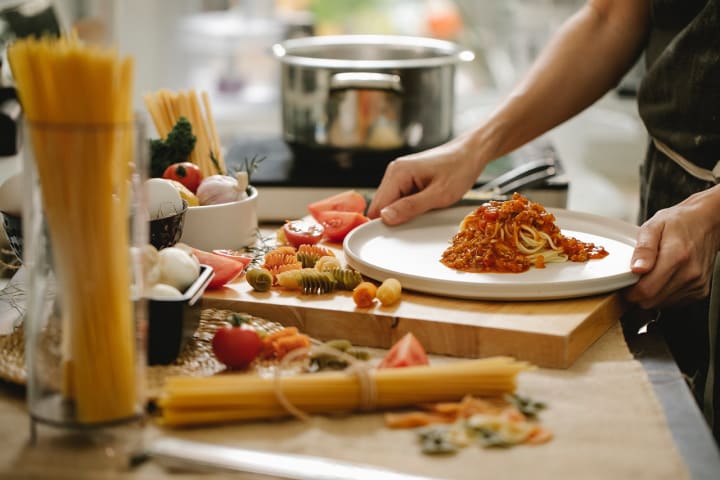I Eat These Simple Foods Which Helps Me to Gain Weight Faster
Know foods to eat , things to do , mistakes to avoid

A complete weight gain diet plan involves consuming a surplus of calories to support muscle growth and overall weight gain. However, it's important to focus on healthy, nutrient-dense foods rather than simply increasing your calorie intake with junk food. Here's a comprehensive diet plan for weight gain, along with some common mistakes to avoid:
1. Calculate your caloric needs: Determine your daily calorie requirements by using an online calculator or consulting with a dietitian. This will help you establish a baseline for your weight gain diet.
2. Increase calorie intake: Aim to consume 300-500 calories above your maintenance level to support weight gain. However, avoid excessive calorie surplus, as it can lead to unhealthy weight gain.
3. Consume balanced meals: Include a balance of macronutrients in each meal. Focus on whole foods such as lean proteins, complex carbohydrates, and healthy fats.
4. Protein-rich foods: Include good sources of protein like lean meats (chicken, turkey, lean beef), fish, eggs, dairy products, legumes, and plant-based protein sources like tofu and tempeh. Protein is essential for muscle growth and repair.
5. Complex carbohydrates: Opt for complex carbs such as whole grains (oats, brown rice, quinoa), sweet potatoes, whole wheat bread, and pasta. These provide sustained energy and essential nutrients.
6. Healthy fats: Include sources of healthy fats like avocados, nuts, seeds, olive oil, and fatty fish (salmon, tuna). These provide additional calories and support overall health.
7. Nutrient-dense snacks: Incorporate calorie-dense snacks such as nuts, seeds, nut butter, dried fruits, and protein bars to increase your daily calorie intake.
8. Regular meals and snacks: Aim to eat 4-6 smaller meals or snacks throughout the day instead of relying solely on three large meals. This helps in maintaining a consistent calorie intake.
9. Hydration: Stay hydrated by drinking plenty of water throughout the day. Avoid sugary drinks and opt for water, herbal tea, and low-calorie beverages.

=> Mistakes to avoid:
1. Relying on junk food: Avoid filling up on unhealthy, calorie-dense foods like sugary snacks, fast food, and processed meals. These may lead to weight gain, but they lack essential nutrients and can negatively impact your health.
2. Ignoring portion sizes: While it's important to increase your calorie intake, pay attention to portion sizes to avoid excessive weight gain. Balance your meals and track your calorie intake if necessary.
3. Neglecting micronutrients: Focus on nutrient-dense foods to meet your vitamin and mineral needs. Include fruits, vegetables, and whole foods to ensure you're getting a wide range of nutrients.
4. Skipping meals or snacks: Consistency is key. Skipping meals or snacks can hinder your weight gain progress. Make sure to eat regularly to maintain a calorie surplus.
5. Neglecting exercise: While diet plays a crucial role in weight gain, incorporating resistance training exercises helps stimulate muscle growth and ensures the weight gained is predominantly muscle rather than fat.
6. Not seeking professional advice: If you're unsure about creating a suitable diet plan or have specific dietary requirements, consult a registered dietitian or nutritionist who can provide personalized guidance.

=> Best weight gaining foods commonly found in South Indian cuisine:
1. Rice: Rice is a staple food in South India and is high in carbohydrates, making it an excellent choice for weight gain. It can be consumed in the form of steamed rice, biryani, or as rice-based dishes like pulao or lemon rice.
2. Coconut: Coconut is widely used in South Indian cooking, providing healthy fats and calories. It is used in curries, chutneys, and desserts. Coconut chutney, coconut milk-based curries, and coconut-based sweets like coconut barfi are popular options.
3. Banana: Bananas are a calorie-dense fruit rich in carbohydrates. They can be eaten as is or incorporated into dishes like banana dosa, banana chips, or as a topping for desserts like banana pudding or banana halwa.
4. Avocado: Avocado, though not native to South India, is now readily available and can be included in your weight gain diet. It can be mashed and spread on toast, added to salads, or used in smoothies for an extra calorie boost.
5. Ghee: Ghee, or clarified butter, is commonly used in South Indian cuisine to enhance flavors and provide healthy fats. It can be added to rice, used for tempering curries, or consumed with dosas and idlis.
6. Cashews: Cashews are a rich source of healthy fats, proteins, and calories. They can be eaten as a snack, added to curries, pulao, or desserts like payasam (kheer) for a creamy and nutty flavor.
7. Lentils and Legumes: Lentils and legumes like toor dal (pigeon peas), moong dal (split green gram), chana dal (split chickpeas), and black-eyed peas are protein-rich foods that aid in weight gain. They are used in various South Indian dishes like sambar, rasam, and dals.
8. Idli and Dosa Batter: Idlis and dosas are popular South Indian breakfast options made from fermented rice and lentil batter. These dishes are high in carbohydrates and can be accompanied by chutneys, sambar, or potato filling for added calories.
9. Curd/Yogurt: Curd or yogurt is a probiotic-rich food that aids digestion and provides protein and healthy fats. It can be consumed on its own, as a side dish, or used as a base for raitas (yogurt-based salads) and buttermilk.
10. Sweet Pongal: Sweet Pongal is a traditional South Indian dessert made from rice, jaggery (unrefined sugar), ghee, and cashews. It is a calorie-dense dish often prepared during festivals and special occasions.





Comments
There are no comments for this story
Be the first to respond and start the conversation.